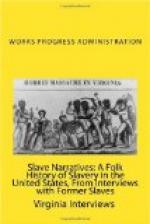[HW: Harper’s Ferry is not [TR: rest illegible]]
“But ah did talk to Lincoln, and ah tol’ him ah wanted to be free, and he was a fine man, ’cause he made us all free. And ah got a ole histry, it’s the Sanford American History, and was published in 1784[HW:18?]. But ah don’t know where it is now, ah misplaced it. It is printed in the book, something ah said, not written by hand. And it says, ’Ah am a ole slave which has suvved fo’ 21 yeahs, and ah would be quite pleased if you could help us to be free. We thank you very much. Ah trust that some day ah can do you the same privilege that you are doing for me. Ah have been a slave for many years.’ (Note discrepancy).
“Aftah the wah, ah came to Cincinnati, and ah was married three times. Mah fust wife was Nannie. Then there was Mollie. They both died, and than ah was married Cora heah, and ah had six child’en, one girl and fo’ boys. (Note discrepancy) They’s two living yet; James is 70 and he is not married. And Bob’s about thutty or fo’ty. Ah done lost al mah rememb’ance, too ole now. But Mollie died when he was bo’n, and he is crazy. He is out of Longview (Home for Mentally Infirm) now fo’ a while, and he jes’ wanders around, and wo’ks a little. He’s not [TR: “not” is crossed out] ha’mless, he wouldn’t hurt nobody. He ain’t married neithah.
“After the wah, ah bought a fiddle, and ah was a good fiddlah. Used to be a fiddlah fo’ the white girls to dance. Jes’ picked it up, it was a natural gif’. Ah could still play if ah had a fiddle. Ah used to play at our hoe downs, too. Played all those ole time songs—Soldier’s Joy, Jimmy Long Josey, Arkansas Traveler, and Black Eye Susie. Ah remembah the wo’ds to that one.”
Smiling inwardly with pleasure as he again lived the past, the old Negro swayed and recited:
Black Eye Susie, you look so fine,
Black Eye Susie, ah think youah mine.
A wondahful time we’re having now,
Oh, Black Eye Susie, ah believe that youah
mine.
And away down we stomp aroun’ the
bush,
We’d think that we’d get back
to wheah we could push
Black Eye Susie, ah think youah fine,
Black Eye Susie, Ah know youah mine.
Then, he resumed his conversational tone:
“Befo’ the wah we nevah had no good times. They took good care of us, though. As pa’taculah with slaves as with the stock—that was their money, you know. And if we claimed a bein’ sick, they’d give us a dose of castah oil and tu’pentine. That was the principal medicine cullud folks had to take, and sometimes salts. But nevah no whiskey—that was not allowed. And if we was real sick, they had the Doctah fo’ us.
“We had very bad eatin’. Bread, meat, water. And they fed it to us in a trough, jes’ like the hogs. And ah went in may shirt tail till I was 16, nevah had no clothes. And the flo’ in ouah cabin was dirt, and at night we’d jes’ take a blanket and lay down on the flo’. The dog was supe’ior to us; they would take him in the house.




